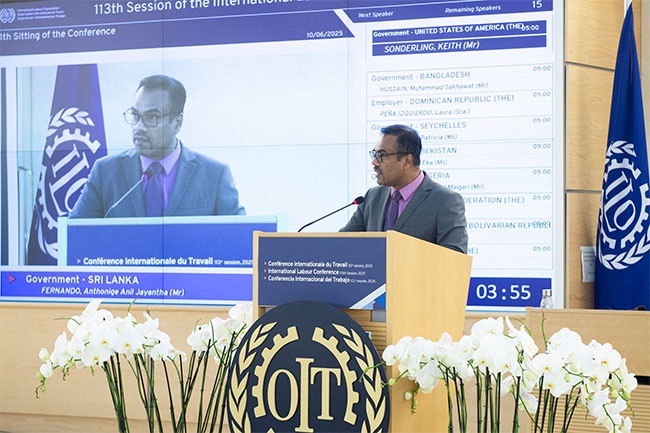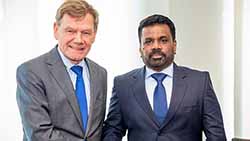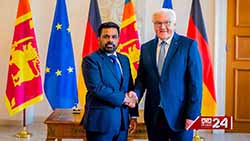Sri Lanka committed to closing gender pay gap and supporting care economy - Labour Minister
June 11, 2025 04:27 pm
Addressing the 113th Session of the International Labour Conference (ILC) in Geneva, Sri Lanka’s Minister of Labour, Anil Jayantha Fernando, reaffirmed the country’s strong commitment to promoting decent work, strengthening labour rights, and advancing social justice.
Representing the government and the people of Sri Lanka, Minister Fernando emphasized the government’s priorities, including occupational safety and health, closing the gender pay gap, supporting the care economy, and protecting workers in the informal and gig economies.
“Sri Lanka remains fully committed to strengthening labour laws to foster vibrant, conflict free and socially responsible production relations. Our focus includes promoting decent work, occupational safety and health, closing the gender pay gap, supporting the care economy, and ensuring protections for all workers, including those in the informal, precarious, and gig economies,” he noted.
He highlighted that Sri Lanka is aligning its labour policies with ILO standards and international best practices, while working towards an inclusive and sustainable economic recovery.
“The people of Sri Lanka have given our government a clear mandate: to eliminate corruption, rebuild the economy, and lay a foundation for a just, inclusive and sustainable future. In this pursuit, we are slowly but steadily stabilizing our economy and working towards establishing a fair, equitable, and deepened democratic society,” he stated.
The Minister noted that despite fiscal constraints, the government has implemented decisive actions, such as increasing public sector salaries by 60–80% in the 2025 national budget and amending the National Minimum Wage Act to promote fairer private sector wages.
He also signaled Sri Lanka’s ambition to shift progressively from a minimum wage to a living wage framework.
“Our long-term aim is to move beyond the concept of a minimum wage progressively towards a living wage for all,” he said.
Minister Fernando underlined Sri Lanka’s expanded tripartite model, incorporating a wider range of stakeholders, and reiterated the importance of international solidarity in addressing global challenges like climate change, technological disruption, and migration.
He concluded by reaffirming Sri Lanka’s unwavering political will to support the ILO’s mission, adding:
“Together, let us strive to build a future of work where no one is left behind irrespective of the nature, type and the place of work by upholding the labour supremacy. Sri Lanka stands ready—with unwavering political will above all—to contribute to this noble and essential task.”












